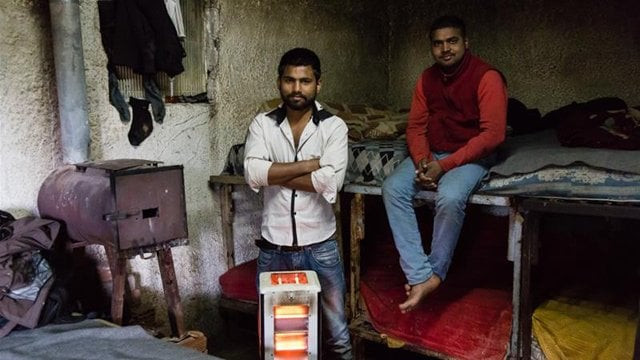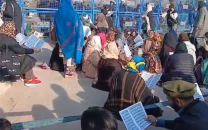Pakistani workers 'regret' migrating to Greece
In Pakistan even our farm animals live better than we do in Greece, says a migrant

Migrant workers Gulfam and Kaleem, in their house on the edge of Poullakida. PHOTO: AL JAZEERA
In an interview with foreman Faisal Razza and his group of farm workers, Al Jazeera found that the nature of their is seasonal. This means they don't stay in one place too long.
They also live in substandard conditions. They cook lunch, not on a cooker but by lighting a fire in a metal drum and cooking the chapati directly on it.
Amir Ali, 25, from Gujrat, Pakistan tries to find humour in the situation. "This is like 19th century cooking. In Pakistan we don't live like this, we'd use gas cookers."
Qatar World Cup labourers working 18-hour days: report
An estimated 90 per cent of Greece's agriculture wage labourers are migrants. When they arrive in the country without money or a legal status, this is their only option.
Adnan Ahmad, 20, has worked for Razza for three months. He was a qualified nurse in Pakistan but went to Europe to find a better life. However, once in Athens, he found himself trapped by closed borders and no money.
Ahmad says workers are lured to farms with the prospect of work.
"Before you arrive you are told that you'll be able to save a lot of money and send some to your family," he says. "They say there is a bed for you and food, and that you only need to pay some money for it."
Pakistani workers say they are paid around $23 for filling 100 crates of oranges, which is usually a day's work. However, the amount is said to vary between nationalities. Albanians receive around $29 for the same work.
Newly arrived workers are also encouraged to recruit friends and relatives, being promised bonuses for doing so.
Workers are charged almost $52 per month for their accommodation and with the inflated amounts for food and other necessities, they find themselves in debt to their foreman.
"They tell you you must work to pay them back the money you owe them. But it is very difficult because they never pay you enough or give you enough work," says Naveed Ahmed.
Ahmed was a pharmacist from Chenab Nagar, Pakistan. Initially he was excited when he was told by a friend about a job on a farm near Argos. However, after a month's work he received no money. This is when him and three other men asked their foreman for permission to leave.
"He [the foreman] and two big guys locked me and my friends in our room," he says. "He said that because one of my friends owed him money we all had to pay his debt or we wouldn't leave."
They were held for four days. They were eventually released when a friend in Athens paid the debt.
11,764 Pakistanis currently jailed or detained abroad: Sartaj Aziz
Very few workers say they receive the money they are owed. However, they choose to stay to avoid arrest and deportation.
Workers are also forced to live in dirty warehouses or cramped buildings.
"In Pakistan, even our farm animals live better than we do in Greece," says Adnan Ahmed.
Faisal Razza, the foreman, is just 19. He left Pakistan and travelled to Greece alone when he was a teenager. Speaking to Al Jazeera, he says he pays his workers fairly and they are free to leave whenever they want.
Many workers left profitable jobs to travel to Europe.
"I lived in Malaysia for 10 years and had good work as an electrician," says Imran Ahmed, Adnan Ahmed's cousin. "Then one day my friend called me from Germany and said the border was open and that I should come to Europe."
Imran speaks fluent Malay but is now stuck in Greece with no money, legal status or common language. "Of course it's the biggest regret of my life," he says.
Mujahid, another Pakistani worker, worked at a shop in Saudi Arabia earning almost $1,580 a month. Now even though he earns almost $21 a day, he is seldom paid his wages.
"My life in Saudi Arabia was so much better than in Europe," he says. "I thought Europe was a good place for hard workers. Now I wonder, 'where is this Europe?'"
Govt failed Pakistanis in foreign prisons
Greece has experienced a decade of economic and social crisis. Living standards have declined and the country is also struggling to cope with the unprecedented influx of refugees.
Migrant workers play an important role in the country's agriculture, which has increased rapidly. However, they are still exploited.
"Pakistani, Bangladeshi [workers] are here illegally, without families and naturally their status is lower in terms of wages, resident status and of course the issue of rights - they have no rights," says Professor Charalambos Kasimis, the general secretary of the Greek Ministry of Agriculture.
This story originally appeared on Al Jazeera



















COMMENTS
Comments are moderated and generally will be posted if they are on-topic and not abusive.
For more information, please see our Comments FAQ